- Home
- Vince Flynn
Enemy of the State Page 3
Enemy of the State Read online
Page 3
The driver shouted a warning and Gaffar picked up on what was happening without missing a beat. He screamed something about Mohammed and his gang and pulled his weapon, firing in the wrong direction to reinforce the illusion of a shooter to the south.
They all followed suit, opening up on the windows of the building across the street. Chunks of wood, vaporized concrete, and shattered glass rained down as Rapp lined up on the back of the driver. A quick squeeze of the trigger dropped him. Leadership gone. Next he turned his weapon on a man from the back of the truck who had seemed unusually wary and athletic.
Gaffar suddenly jerked and went down hard. It was violent enough to make Rapp hesitate for a moment, concerned that there was a shooter unaccounted for. He quickly realized it was just for show. Gaffar was now on his back behind the three surviving men.
Rapp returned to his target and dropped the man just as his companion lost the back of his head to a round fired by Gaffar. The last man standing suddenly stopped shooting and looked around him, confused. A moment later Rapp put a bullet into his right temple.
Then everything went silent again.
Rapp motioned to the others before running into the street to gather weapons. “Are you injured?”
“I’m fine,” Gaffar said, getting up and dusting himself off.
Rapp tossed him an AK before dumping the other guns into the bed of the pickup. By then Shada was behind him and he helped her over the gate. Gaffar jumped in next to her and began pulling the others over the side. Mohammed helped Yusef in before running for the passenger door of the cab.
By the time Rapp began accelerating up the road, Gaffar had the people in back holding their weapons in a way that would make them look enough like an ISIS patrol to fool the casual observer.
“There,” Mohammed said, pointing through the windshield. “Turn left and swing around. We’ll have a straight path out of the city.”
Rapp did as he suggested but didn’t otherwise acknowledge him. With a little luck, they would be on a chopper in an hour and he would never lay eyes on Mohammed Qarni again.
CHAPTER 4
Rabat
Morocco
HAYK Alghani stood at the edge of the window, looking down on the winding souk below. He’d seen the flash of headlights a few moments ago, but now they’d gone dark. The suddenness of it suggested not a passing vehicle but one that had stopped.
The dizziness he felt began to intensify, causing his stomach to churn nauseatingly. He gagged and was forced to run for the bathroom. Pulling open the cracked toilet lid, he vomited into its stained bowl. Not much longer, he told himself. Soon it would all be over.
Or would it?
There was no question that he had done this to himself, but it seemed like another life now. The arrogant young man who had fled authorities in Sevastopol to join ISIS no longer existed inside him. And perhaps never had.
As always in his life, his current problems had begun with a woman. She was beautiful and impassioned—a devout Muslim who thought about nothing but God and the struggle. Despite having abandoned Islam after leaving home as a teenager, he became infatuated with her unquestioning faith and unwavering sense of purpose. It was she who convinced him to flee into the welcoming arms of jihad. To give up his life of petty crime in favor of a far grander purpose: the creation of a new caliphate.
After a rushed marriage, they used contacts she’d made on the Internet to cross into Syria and then they were taken overland by ISIS representatives. To where, neither of them knew, but it didn’t matter. They were out of the European authorities’ reach and he was under the seductive spell of her beauty and her world of radical Islam. Wherever they ended up, they would fight for God against the evils of the West.
It was a simple matter to pinpoint the moment it had all gone wrong. They had been traveling for days, dodging Assad’s death squads, Russian planes, and American drones. Sleep had consisted of fleeting moments in bombed-out ruins or caves. Finally, they arrived in an ISIS outpost beyond the infidels’ reach. Mira went with a group of women to bathe. There she would have taken off her chador and been seen by them.
Later that day, he and Mira were separated from the rest of the recruits and put in a sweltering SUV that headed west across the desert. He started to become nervous when the driver refused to answer questions, but not Mira. Her certainty was unshakable. She believed that they had been chosen for some special purpose. That her destiny was to change the course of history.
When they were granted a personal audience with Mullah Sayid Halabi, she became even more ecstatic. To be brought before the man who was so loved by Allah. Who struck such terror into the hearts of the Americans. It was an honor that even she had never considered. He remembered her pledging her endless devotion and the amusement in the pale blue eyes that Halabi had been gifted by ancient invaders of his homeland.
Her eyes had been very different. Dark and filled with the glory of God. That quickly turned to horror when she was informed that her role in the struggle would be as a member of Mullah Halabi’s harem. Alghani could still hear her pleading with him to save her as she was dragged from the room. But there was nothing he could do.
Once she was gone, he’d found himself standing alone before the ISIS leader. The amusement was gone from his eyes. They now seemed dead. Like water pooled in the empty sockets of a skull.
He had quickly pledged his own emphatic allegiance to the mullah and expressed how proud he was to provide his young wife to the cause. When Halabi’s men began to close in from behind, Alghani desperately tried to find something that would make those eyes come alive again. He finally struck on it when he mentioned his great skill in financial crimes. The subtle change in the mullah’s expression made him speak even faster, boasting about his expertise in fraud, laundering, and concealing bank transactions from authorities. A motion from the mullah’s hand stopped the advance of his men and changed Alghani’s life forever.
He had spent more than a year in the service of Halabi, setting up financial networks and collecting money from sympathizers around the world, but particularly from Saudi Arabia. It was a squalid but bearable life right up until his existence came to the attention of the CIA.
Three months ago he’d been running a routine errand in Berlin’s financial district when two men jumped him and pulled him into a van. He awoke naked on a concrete floor, with zip ties securing his hands and feet. There was no light and no sense of time. He shouted to his captors but got no answer. He pleaded. He begged. He even prayed. Finally, the cold, hunger, and isolation eclipsed his fear of the mullah and he offered anything—everything—for a brief moment of human contact.
It was then that he had met Mitch Rapp. The American had the same dead expression as Halabi and the same capacity for violence, but the similarities ended there. Where the ISIS leader was volatile, unpredictable, and cared for nothing but his own perceived stature in the eyes of his god, Rapp was infinitely rational. He knew his enemies and what was necessary to defeat them. The question was whether Alghani could assist him in his efforts or whether he would be more useful with a bullet in his head.
Without Mira, he had once again lost his faith. In the end, he was just a criminal. A self-serving little man who cared nothing for Islam or the caliphate. He just wanted to survive.
Rapp had given him that opportunity. After telling the CIA everything, he was returned to ISIS with orders to provide regular reports on the work he did for them. When he informed the Agency of the Rabat meeting, Rapp decided he wanted the courier. And in exchange, Alghani would be given his freedom.
There was a quiet knock on the front door and Alghani rinsed his mouth out before striding across the empty flat. He had barely turned the knob when a powerful man in a dark suit forced his way in. He moved quickly through the apartment, searching for anything amiss. Finally, he shoved Alghani against a wall and frisked him. The only thing he had
was a phone and the man took it, removing the battery before dropping it on the floor. Satisfied that the flat was secure, he retreated to a corner and spoke into a microphone attached to his wrist.
A moment later another man entered. He was thin but had a belly that protruded over a belt that looked like it cost more than most people made in a year. Alghani took an involuntary step back and a satisfied smile curled the man’s lips. Who were they? He was supposed to meet a lone courier. An Egyptian in his fifties who knew more about the individuals involved in financing ISIS than anyone but Mullah Halabi himself. Had the CIA betrayed him? Had the Mullah discovered his treachery? Were these men here to kill him?
Alghani took another step back, but then noticed the suitcase in the man’s hand. Having had significant experience with these kinds of exchanges, he knew that it was the correct size to hold the amount of cash that was to change hands that day. One million U.S. dollars.
“You have the money?” Alghani asked, hoping to gain some understanding of his situation.
“Of course,” the man said. “But I’m sorry that Mullah Halabi couldn’t come personally. He and I have much to discuss. The creation of the caliphate and the spread of the one true religion is no small task. And the Western powers are no small opponent.”
Alghani nodded submissively. He’d initially thought that the man was a wealthy Saudi businessman but he could now see that he was wrong. The regal posture, the comically exaggerated sense of self-importance, the recklessness of cutting out the Egyptian and handling this errand personally. A young prince.
Alghani had dealt with them many times, both in his current capacity and previously when he’d targeted them in a number of real estate scams. As near as he could tell, they were all the same. Useless, arrogant, stupid men who believed that their privileged birth put them above the rest of humanity. Qualities that made them attractive targets for graft and utterly blind to the fact that they would be the first to die in a caliphate led by Sayid Halabi.
In this instance, though, the royal’s presence created an impossibly dangerous situation. He had promised Rapp the Egyptian courier. Not a pampered child. Would the CIA man think he had been duped? Would he revoke his promise of freedom in favor of a summary execution?
The man held out the suitcase. “A gift from me to your leader. The first step in drawing the Americans into a fight that they can never win.”
Alghani accepted the case and confirmed its weight at around ten kilograms. He expected the young Saudi to turn and disappear from his life forever, but instead the idiot began to speak again.
“We’ll battle the American cowards from without while simultaneously destroying them from within. I know them well. I was educated in the West and have many business interests in the United States. The American people are weak and easily manipulated. They see things in terms of five years. Perhaps ten. We understand that those time frames are meaningless. Allah is eternal and favors the patient. We will defeat them over the next fifty years. Or a hundred. Or even a thousand. As their society crumbles under the weight of its own wickedness and lack of cohesion, we will rise up to take their place.”
“Praise be to Allah,” Alghani responded, trying to comprehend why this pup wouldn’t leave. What profit could there be in staying? Surely there were safer places that he could listen to himself talk.
“As I say, I know the Americans,” he continued. “Better than they know themselves. I would like to offer my services to the mullah. If he wants to destroy the Westerners, he must first understand them. His background . . .” The Saudi’s voice faded for a moment. “. . . would make that kind of understanding difficult.”
Alghani had to struggle not to react. Halabi had been educated in madrassas likely financed by this man’s own family. While the mullah indeed lacked direct experience with the West, he had retaken enormous amounts of territory lost by his predecessor and created a complex command and control structure that the world was only now beginning to understand. What had the pampered man-child standing in front of him ever accomplished? His only responsibility was to cash the checks provided to him and to try not to lose it all in Europe’s casinos.
“I will pass on your generous offer to the mullah when I see him. I’m sure he would greatly value your counsel.”
Like others of his kind, the man was easily flattered. He smiled condescendingly and motioned to his bodyguard. A moment later they were finally gone.
Alghani opened the briefcase and emptied the bundles of American dollars on the floor before retrieving his phone and replacing the battery. He stood by the window, peering out and trying to slow his breathing. A few moments later he saw headlights flash on and move away. When the darkness and silence had descended again, he made a move for the door but stopped with his hand on the knob.
What should he do? Call Rapp’s people and tell them that the man he’d met with wasn’t the one they’d expected? Or should he just run? What would give him the best chance of forever disappearing from the gaze of Sayid Halabi and, even more important, from the gaze of Mitch Rapp?
CHAPTER 5
Al-Shirqat
Iraq
REPEAT that,” Rapp said into his throat mike. “I lost you.”
No response.
Despite having to deviate from the initial plan and take the truck, the operation was going pretty smoothly. Mohammed’s lifelong familiarity with the area had gotten them on the road out of town without being seen and with no wrong turns. Al-Shirqat was five miles in Rapp’s rearview mirror and he was estimating that they’d arrive at the LZ in another six. The road surface was better than his intel had suggested and the bottomed-out pickup was negotiating it with no significant problems. Its maximum speed wasn’t much over thirty, but the wheels hadn’t fallen off and all the gauges looked good.
“Marcus! Come in!”
“Hold . . .” came the static-ridden reply. “Trying to fix . . .”
Marcus Dumond was a computer hacker who would have been in prison if it weren’t for Rapp intervening and giving him a job. Over the past couple of years he’d become increasingly involved in these kinds of operations and had proved his worth many times over. In a way, he was a victim of his success. He despised being involved in life-or-death situations and knew precisely nothing about military tactics. His grasp of technology, though, was second to none.
“Penetrating the army’s jamming is a pain in my ass!” he said when he came back on the comm. The military was doing everything it could to keep electronic communications down in ISIS-held territory, and Dumond had set up a narrow encrypted band to cut through. Unfortunately, its effectiveness was spotty.
“I’ve got you back,” Rapp said, slamming into a deep rut that the feeble headlight hadn’t picked up. He glanced back to confirm the people riding in the bed hadn’t been thrown out. Gaffar anticipated his concern and gave a few encouraging slaps on top of the cab.
“The good news is that the chopper’s on schedule,” Dumond said.
“And the bad news?”
“You’ve got a patrol coming at you from the north. Same road.”
“How far out?”
“Call it two miles. You should be seeing their lights pretty soon.”
“Any detours I can take?”
“None. Can you just go off road a hundred yards? They’ll drive right by.”
“We’d be lucky to make it ten feet before we bog down.”
“They probably won’t do any better, then. Go as far as you can and then move fast to the LZ on foot. They’ll probably see your truck and come after you, but, traveling as the crow flies, you’d just have to stay ahead of them for about four miles. Mostly flat terrain with a few moderately rocky sections.”
An easy task if he’d been with Coleman’s team, but this crew would get chased down inside of five minutes.
“Not a chance.”
“Then I�
�m out of ideas, Mitch. I can tell you this, though: if you keep on like you are, you’re going to run right into them.”
Rapp swore under his breath. “What’s happening in town?”
“I’ve got the drone over top of you, so my view isn’t as good. They’ve definitely found the mess you made and have patrols converging on the area. One vehicle seems to be tracking your path out of the city somehow, but too slow to be a problem for you.”
Not necessarily true, Rapp knew. While the U.S. had been successful at shutting down cell and satellite communication in the area, they hadn’t been able to do much about short-range radio. It was possible that the patrol ahead of them knew what was happening in town and was looking for them.
“Understood. Stand by.”
Rapp looked over at Mohammed and switched to Arabic. “We’ve got a patrol coming in our direction.”
“A patrol?” he said, twisting in his seat. “What do you mean? There are no turns off this road. They—”
“Calm down. We’re going to be fine. You’re probably going to have to take over driving, though. Just stay on the road and follow the directions I gave you to the LZ.”
“I don’t understand.” His words came out in a barely comprehensible jumble. “Why would I have to drive? What are you going to do? Where will you be?”
Rapp ignored him, instead banging a fist on the window behind him. A moment later Gaffar leaned around and stuck his bearded face in the open driver’s-side window.
“Do we have a problem, Mitch?”
“Maybe. Maybe not. There’s a patrol coming down on us. Tell everyone to look friendly.”
He nodded and pulled back into the bed to get his people in line.
“Mitch . . .” Mohammed started.

 Consent to Kill
Consent to Kill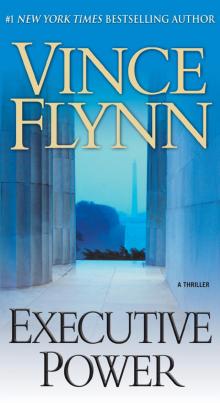 Executive Power
Executive Power Protect and Defend
Protect and Defend Term Limits
Term Limits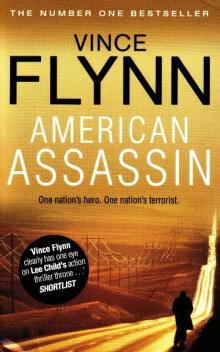 American Assassin
American Assassin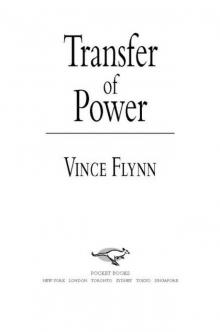 Transfer of Power
Transfer of Power Kill Shot
Kill Shot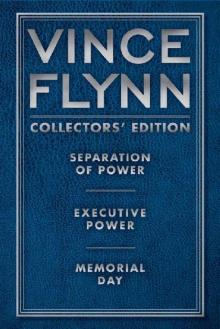 Vince Flynn Collectors' Edition 2
Vince Flynn Collectors' Edition 2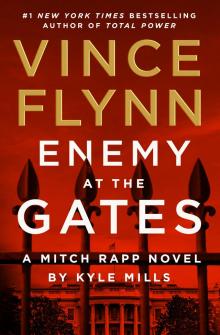 Enemy at the Gates
Enemy at the Gates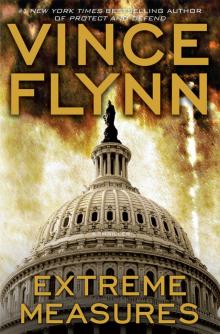 Extreme Measures
Extreme Measures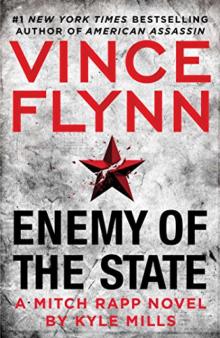 Enemy of the State
Enemy of the State Act of Treason
Act of Treason Pursuit of Honor
Pursuit of Honor The Survivor
The Survivor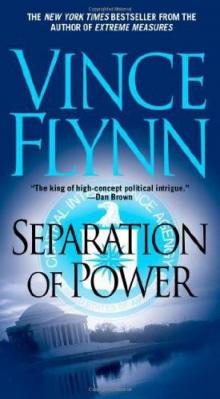 Separation of Power
Separation of Power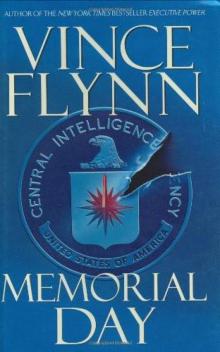 Memorial Day
Memorial Day The Last Man
The Last Man Pursuit of Honor_A Thriller
Pursuit of Honor_A Thriller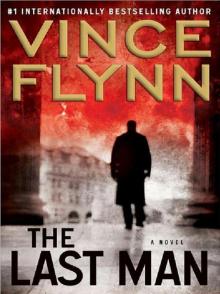 Mitch Rapp 13 - The Last Man
Mitch Rapp 13 - The Last Man Consent to Kill:
Consent to Kill: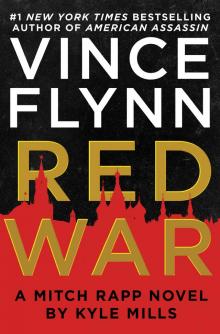 Red War
Red War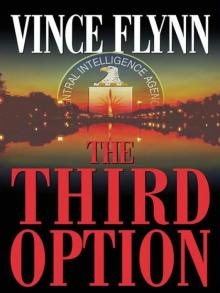 Mitch Rapp 02 - The Third Option
Mitch Rapp 02 - The Third Option Mitch Rapp 05 - Memorial Day
Mitch Rapp 05 - Memorial Day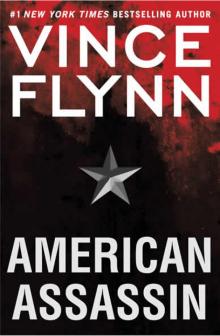 Mitch Rapp 11 - American Assassin
Mitch Rapp 11 - American Assassin Mitch Rapp 14 - The Survivor
Mitch Rapp 14 - The Survivor Mitch Rapp 06 - Consent to Kill
Mitch Rapp 06 - Consent to Kill Term Limits mr-1
Term Limits mr-1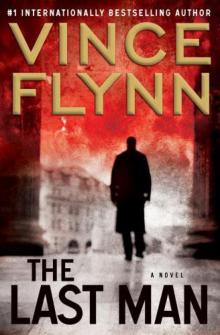 The Last Man mr-13
The Last Man mr-13 Memorial Day mr-5
Memorial Day mr-5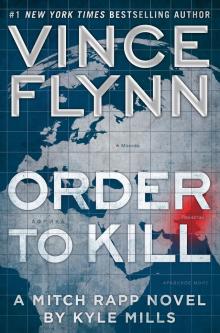 Order to Kill
Order to Kill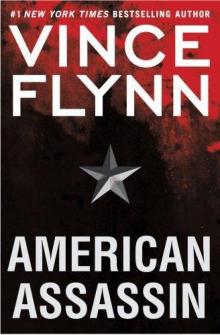 American Assassin: A Thriller
American Assassin: A Thriller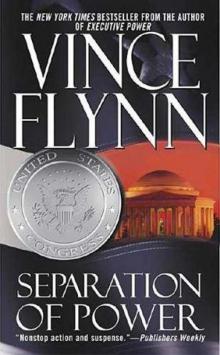 Separation of Power mr-3
Separation of Power mr-3